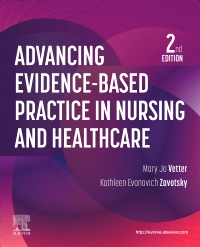
Advancing Evidence-Based Practice in Nursing and Healthcare, 2nd Edition
Paperback

**Selected for 2025 Doody’s Core Titles® in Quality Improvement**
Equip your students to expertly conduct evidence-based practice (EBP) or quality improvement (QI) projects! Advancing Evidence-Based Practice in Nursing and Healthcare, Second Edition, is a straightforward yet comprehensive guide to planning, implementing, and evaluating EBP and QI projects to improve healthcare quality and outcomes. Building on the legacy built by Geri LoBiondo-Wood and Judi Haber, this edition is newly tailored to meet the goals and strategic priorities of a variety of healthcare settings, with the tenets of ANCC Magnet designation, JCAHO accreditation, and other current regulatory and quality standards integrated throughout. This edition features a new focus on both academic and practice settings, including content informed by recent guidance documents such as The Essentials: Core Competencies for Professional Nursing Education (AACN, 2021), Advancing Healthcare Transformation: A New Era for Academic Nursing (AACN, 2016), and the principles of Future of Nursing 2020-2030: Charting a Path to Achieve Health Equity (NASEM, 2021). Also new to this edition are 10 new chapters (including topics related to the impact of academic practice partners; nurse wellness; diversity, equity, inclusion, and belonging; population health and innovation; new models of evidence-based practice; and more!) and an entirely new unit on Evidence-Based Practice Innovation in Healthcare.
-
- NEW! Focus on both academic and practice settings includes content informed by recent guidance documents such as The Essentials: Core Competencies for Professional Nursing Education (AACN, 2021), Advancing Healthcare Transformation: A New Era for Academic Nursing (AACN, 2016), and the principles of Future of Nursing 2020-2030: Charting a Path to Achieve Health Equity (NASEM, 2021)
- NEW! Ten additional chapters cover topics related to the impact of academic practice partners; nurse wellness; diversity, equity, inclusion, and belonging; population health and innovation; new models of evidence-based practice; and more — plus an entirely new Evidence-Based Practice Innovation in Healthcare unit
- NEW! Tailored content addresses the goals and strategic priorities of a variety of healthcare settings, with the tenets of ANCC Magnet designation, JCAHO accreditation, and other current regulatory and quality standards integrated throughout
- UPDATED! Evidence-based practice (EBP) and quality improvement (QI) coverage presents the most up-to-date thinking on processes and projects, as well as examples and excerpts from high-quality, published EBP and QI projects
- Additional practice examples help students prepare to apply key concepts to the practice setting
- Increased emphasis on need-to-know content guides students through EBP and QI projects
- Contributions from 48 expert authors from practice and academia share their expertise on the impact of EBP/QI/research on healthcare outcomes
- Straightforward yet comprehensive guidance covers planning, implementation, and evaluation of EBP and QI projects to improve healthcare quality and outcomes.
- Logical organization begins with foundational content and then works through the processes of developing EBP and exploring clinical questions, implementing results, evaluating and disseminating information, and innovating in healthcare
-
PART I: Introduction
1. Leadership Implications for Evidence-Based Practice, Nursing Practice, and Healthcare
2. Academic–Practice Partnership for the Future of Nursing and Healthcare
3. Overview of Evidence-Based Practice
4. Models to Support Evidence-Based Practice Outcomes
PART II: Processes of Developing Evidence-Based Practice and Questions in Various Clinical Settings
5. Developing Compelling Clinical Questions
6. Searching the Literature for Evidence
7. Principles of Assessing Research Quality
8. Intervention Studies
9. Observational Studies
10. Systematic Reviews and Clinical Practice Guidelines
11. Qualitative Studies
12. Sources of Data to Drive Evidence-Based Practice and Quality Improvement
13. Understanding Statistics for Evidence-Based Practice
PART III: Implementation
14. Evidence-Based Approaches for Improving Health Care Quality
15. Planning for Success
16. Launching Implementation
17. Implementation Strategies for Stakeholders
18. Patient-Centered Evidence-Based Practices
PART IV: Evaluation and Dissemination
19. Evaluation of Evidence Based-Practice
20. Nursing Scholarship
21. Dissemination
PART V: Evidence-Based Practice Innovation in Healthcare
22. Doctorally Prepared Nurses: Synergy for Professional Power
23. Innovation and New Models of Evidence-Based Care
24. Nursing Informatics
25. Population and Public Health
26. Health Policy
27. Nurse Wellness: An Evolving Concept and Its Connection to Health Care System Outcomes
28. Harnessing the Power of Diversity, Equity, Inclusion, and Belonging to Advancing Health Care Systems Outcomes
AONL Nurse Leader Core Competencies Appendix A
IPEC Core Competencies for Interprofessional Collaborative Practice Appendix B
National Institute of Nursing Research 2022–2026 Strategic Plan Appendix C
Person-Centered Care Appendix D
GLOSSARY
INDEX


 as described in our
as described in our 